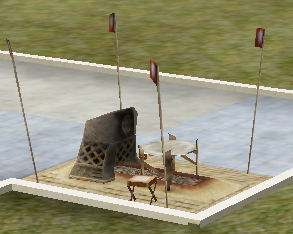The Wiki for Tale 4 is in read-only mode and is available for archival and reference purposes only. Please visit the current Tale 11 Wiki in the meantime.
If you have any issues with this Wiki, please post in #wiki-editing on Discord or contact Brad in-game.
Glazier's Bench
The Glazier's Bench is used to make various glass products, such as glass rods and sheet glass. It runs on charcoal.
Source
This building becomes available after you have learned the Glassblowing tech.
Cost
- 200 Firebricks
- 400 Bricks
- 1200 Sand
Built in a Compound. Uses 11x17 cells.
Types of Glass
A Glazier's Bench has a reservoir that can contain up to 50 deben of molten glass. It must contain at least 20 in order to craft an item from that glass, regardless of how much the item will actually consume. This means that 19 deben of glass will never be used. Fortunately, unused molten glass normally stays in the bench between uses, even after cooling, so it is not necessary to fill the reservoir from scratch every time.
An individual bench can only contain one type of glass (soda, normal, or jewel) at a time. If you want to use a bench for a different type of glass, you must deliberately empty the reservoir and start over. Since this is so wasteful, it's generally more economical to build an additional Glazier's Bench for the new glass type instead.
| Glass Type | Melting Point | Working Temp | Ingredients |
|---|---|---|---|
| Soda Glass | 3200° | 1600–2400° | 1 Lime, 2 Soda, 10 Sand |
| Normal Glass | 3200° | 1600–2400° | 1 Lime, 2 Potash, 10 Sand |
| Jewel Glass | 4400° | 1600–2400° | 1 Lime, 2 Potash, 10 White Sand |
Related Pages
Use
From T3 - should probably rewrite and move to the Glassmaking guide page instead.
Glazier's Benches use [{Charcoal]] as fuel, and in order to melt and shape glass the bench must be heated by adding charcoal. While using the bench, the window will display the current temperature, as well as options to add 2, 6, or 12 charcoal.
Adding charcoal causes the temperature to increase over a period of about a minute -- the more charcoal added, the greater the increase. This is followed by another minute or so where the temperature stays constant, followed by a gradual cooling.
If charcoal is added while the bench is still in the "heating-up" phase from the last charcoal addition, this will trigger a dramatic spike in temperature. This can be a useful way to heat the bench quickly to its desired temperature. However, it is disastrous if it happens while creating an item (when the temperature must be kept within a certain range), as the spike in temperature will almost definitely ruin the item. Keeping the bench's temperature constant demands careful timing between charcoal additions.
Left alone, a bench will eventually begin cooling until its temperature returns to zero. It is not possible to speed up this cooling process. Items made on a bench cannot be taken out until the bench completely cools.
